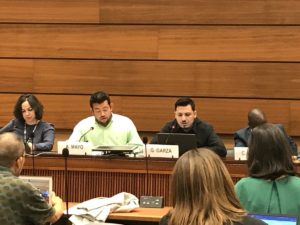With a strong link to the 20th Anniversary of the Guiding Principles on Internal Displacement, this year’s session of the Human Rights Council included a strong focus on IDPs. In particular, and based on experiences in Honduras, Fiji and other countries facing internal displacement, this included a specific emphasis on the value of profiling data to inform national policy development and highlighted the fundamental importance of IDP participation for effective action.
In addition to the regular reporting of the Special Rapporteur, two specific events were organized. The first, a panel session within the Council itself, highlighted the four thematic areas of the GP20 Plan of Action, including how data and evidence are vital to inform national action. The second, a side event hosting four IDP panellists from Nigeria, Japan, South Sudan and Mexico, showcased the necessary role of IDP participation to shape an effective response.

With speakers from OHCHR, UNHCR, the African Commission on Human and People’s Rights, and representatives of the Governments of Honduras and Fiji, the panel session on internal displacement drew a large audience. Following high-level opening remarks from UNHCR and OHCHR, the Special Rapporteur on the human rights of IDPs moderated the panel of experts.
Focusing on the value of data and evidence, Ms Alba Marcela Castañeda (Under-Secretary for Human Rights of Honduras) shared several key messages based on her country’s experience in developing a national policy and response strategy for displacement. In particular, she highlighted the importance of having a thorough analysis of the displacement situation, including the experience of IDPs and the scale of the displacement crisis. Interestingly, the Under-Secretary emphasised the importance of facilitating the use of this data to under-pin a statewide response, and explained how this was concretely managed -through the establishment of an inter-institutional Commission in Honduras.
> Read more about JIPS support in Honduras <
We can all agree on the fact that data is important, but what kind of data is needed can be a harder question to answer. In this regard, the side event demonstrating the fundamental role of IDP participation shed some light.
Through inspiring interventions, IDPs from Nigeria, Japan, South Sudan and Mexico shared their experiences and put several issues on the table. From the identification of priority needs to the targeting of particularly vulnerable population groups, from locating and accessing out-of-camp IDPs to understanding the impact of displacement on peoples’ lives: these were just some of the common challenges that an effective engagement of displaced and displacement-affected communities could help mitigate.
Whilst the benefits of community engagement go far beyond shaping data processes, the added value of engaging communities within profiling is something JIPS has been investing a lot of energy this year. Through developing a set of principles, piloting different methodologies and consolidating lessons to feed into our services and guidance, we hope to strengthen the impact that community engagement can have on the relevance and usefulness of profiling results.
As JIPS, we were excited to see the great attention that the 38th Human Rights Council session devoted to internal displacement. In particular, the focus on IDPs perspectives demonstrated the importance of a new IDP-centred approach across the sector, where displaced and displacement-affected populations stop being perceived as mere recipients of humanitarian and development aid, but start being considered as relevant and responsible actors of change. In addition, the inclusion of data – collected and analysed by national authorities – as a starting point for recognising internal displacement, developing policy and informing response, is also warmly welcomed.